Plot
An old man is disoriented within an unknown chamber and has no memory about who he is or how he has arrived there. He tries to understand something from the relics on the desk, examining the circumstances of his confinement and searching for reasons and a method to exit.
Determining that he is locked in, the man — identified only as Mr. Blank — begins reading a manuscript he finds on the desk, the story of another prisoner, set in an alternate world the man doesn't recognize. Nevertheless, the pages seem to have been left for him, along with a haunting set of photographs. As the day passes, various characters call on the man in his cell — vaguely familiar people, some who seem to resent him for crimes he can't remember — and each brings frustrating hints of his identity and his past. All the while an overhead camera clicks and clicks, recording his movements, and a microphone records every sound in the room. Someone is watching.

Paul Benjamin Auster is an American writer and film director. His notable works include The New York Trilogy (1987), Moon Palace (1989), The Music of Chance (1990), The Book of Illusions (2002), The Brooklyn Follies (2005), Invisible (2009), Sunset Park (2010), Winter Journal (2012), and 4 3 2 1 (2017). His books have been translated into more than forty languages.

Life A User's Manual is Georges Perec's most famous novel, published in 1978, first translated into English by David Bellos in 1987. Its title page describes it as "novels", in the plural, the reasons for which become apparent on reading. Some critics have cited the work as an example of postmodern fiction, but Perec preferred to avoid labels and his only long-term affiliation with any movement was with the Oulipo or OUvroir de LIttérature POtentielle.
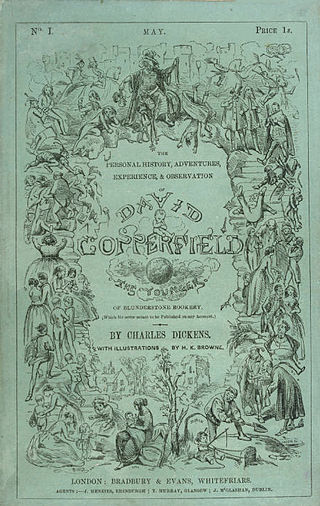
David Copperfield is a novel in the bildungsroman genre by Charles Dickens, narrated by the eponymous David Copperfield, detailing his adventures in his journey from infancy to maturity. It was published as a serial in 1849 and 1850 and then as a book in 1850.

The Remains of the Day is a 1989 novel by the Nobel Prize-winning British author Kazuo Ishiguro. The protagonist, Stevens, is a butler with a long record of service at Darlington Hall, a stately home near Oxford, England. In 1956, he takes a road trip to visit a former colleague, and reminisces about events at Darlington Hall in the 1920s and 1930s.
"Pierre Menard, Author of the Quixote" is a short story by Argentine writer Jorge Luis Borges.

Moon Palace is a novel written by Paul Auster that was first published in 1989.
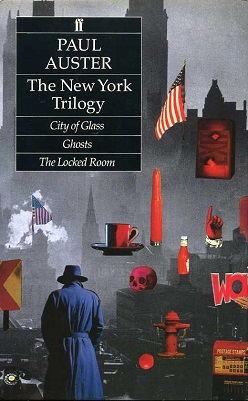
The New York Trilogy is a series of novels by American writer Paul Auster. Originally published sequentially as City of Glass (1985), Ghosts (1986) and The Locked Room (1986), it has since been collected into a single volume. The Trilogy is a postmodern interpretation of detective and mystery fiction, exploring various philosophical themes.

Legend is a science fiction Western television series that ran on UPN from April 18, 1995, until August 22, 1995, with one final re-airing of the pilot on July 3, 1996. It starred Richard Dean Anderson and John de Lancie.
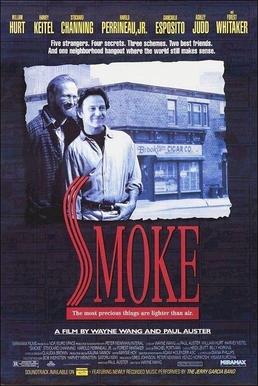
Smoke is a 1995 American independent film by Wayne Wang and Paul Auster. The original story was written by Paul Auster, who also wrote the screenplay. The film was produced by Greg Johnson, Peter Newman, Kenzo Horikoshi, and Hisami Kuroiwa. Among others, it features Harvey Keitel, William Hurt, Stockard Channing, Harold Perrineau Jr., Giancarlo Esposito, Ashley Judd, and Forest Whitaker.

A Reader's Manifesto is a 2002 book by B. R. Myers expanded from his essay in the July/August 2001 issue of The Atlantic Monthly magazine. Myers criticized what he saw as the growing pretentiousness of contemporary American literary fiction, especially in contrast to genre fiction.

The Book of Illusions is a novel by American writer Paul Auster, published in 2002. It was nominated for the International Dublin Literary Award in 2004.

Oracle Night is a 2003 novel by American author Paul Auster.

Molloy is a novel by Samuel Beckett first written in French and published by Paris-based Les Éditions de Minuit in 1951. The English translation, published in 1955, is by Beckett and Patrick Bowles.
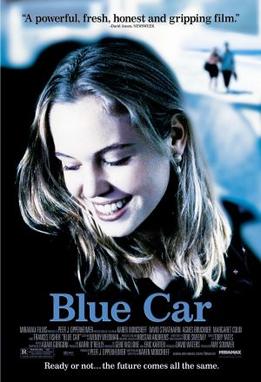
Blue Car is a 2002 American drama film directed and written by Karen Moncrieff. It was the first film she directed and wrote. The film stars David Strathairn, Agnes Bruckner, Margaret Colin, and Frances Fisher.

Leviathan is American writer Paul Auster’s seventh novel, published by Viking Press in 1992. The novel follows the life and crimes of a man who decides to take action over words to deliver his message to the world, as told by his estranged best friend.

Sunset Park is a novel by Paul Auster published in November 2010.

The Brooklyn Follies is a 2005 novel by Paul Auster.

Mr William Collins is a fictional character in the 1813 novel Pride and Prejudice by Jane Austen. He is the distant cousin of Mr Bennet, a clergyman and holder of a valuable living at the Hunsford parsonage near Rosings Park, the estate of his patroness Lady Catherine De Bourgh, in Kent. Since Mr and Mrs Bennet have no sons, Mr Collins is also the current heir presumptive to the Bennet family estate of Longbourn in Meryton, Hertfordshire, due to the estate being entailed to heirs male. Mr Collins is first introduced during his visit to Longbourn. His dull-witted character is in parallel to another 'Austen' character, Mr. Rushworth, from Mansfield Park. Mr Collins is also somewhat comparable to the Shakespearean character, Malvolio, from Twelfth Night.
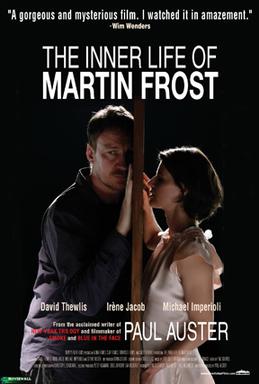
The Inner Life of Martin Frost is a 2007 American romantic-mystery drama film written and directed by Paul Auster and starring David Thewlis, Irène Jacob, and Michael Imperioli. The film is about an author who having just completed his fourth novel travels to his friends' vacant country house to spend a few weeks alone. There he meets a beautiful and mysterious woman who inspires him to write a new story. Filmed in Azenhas do Mar in Sintra, Portugal in the spring of 2006, The Inner Life of Martin Frost is Auster's fourth film as director and writer. The film premiered at the New Directors/New Films Festival on March 21, 2007, and was released in the United States on September 7, 2007.

4 3 2 1 is a novel by Paul Auster published in January 2017. At the time of its publication, it was the first new Auster novel to have appeared in seven years. Auster worked on the book seven days a week for three years and wrote it in long hand. At 866 pages, the novel is much longer than any of his previous works. In September 2017 it was shortlisted for the 2017 Man Booker Prize.



















